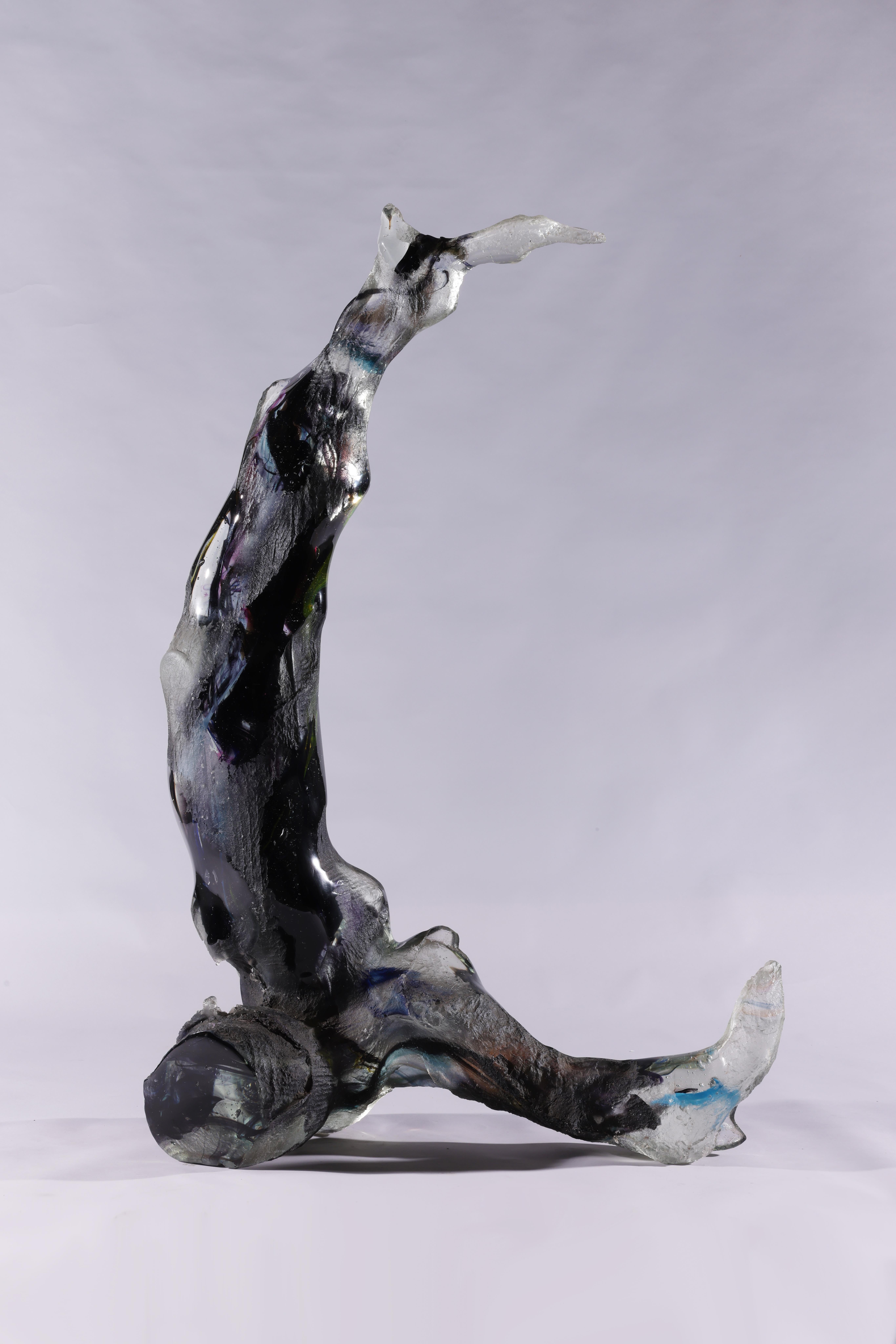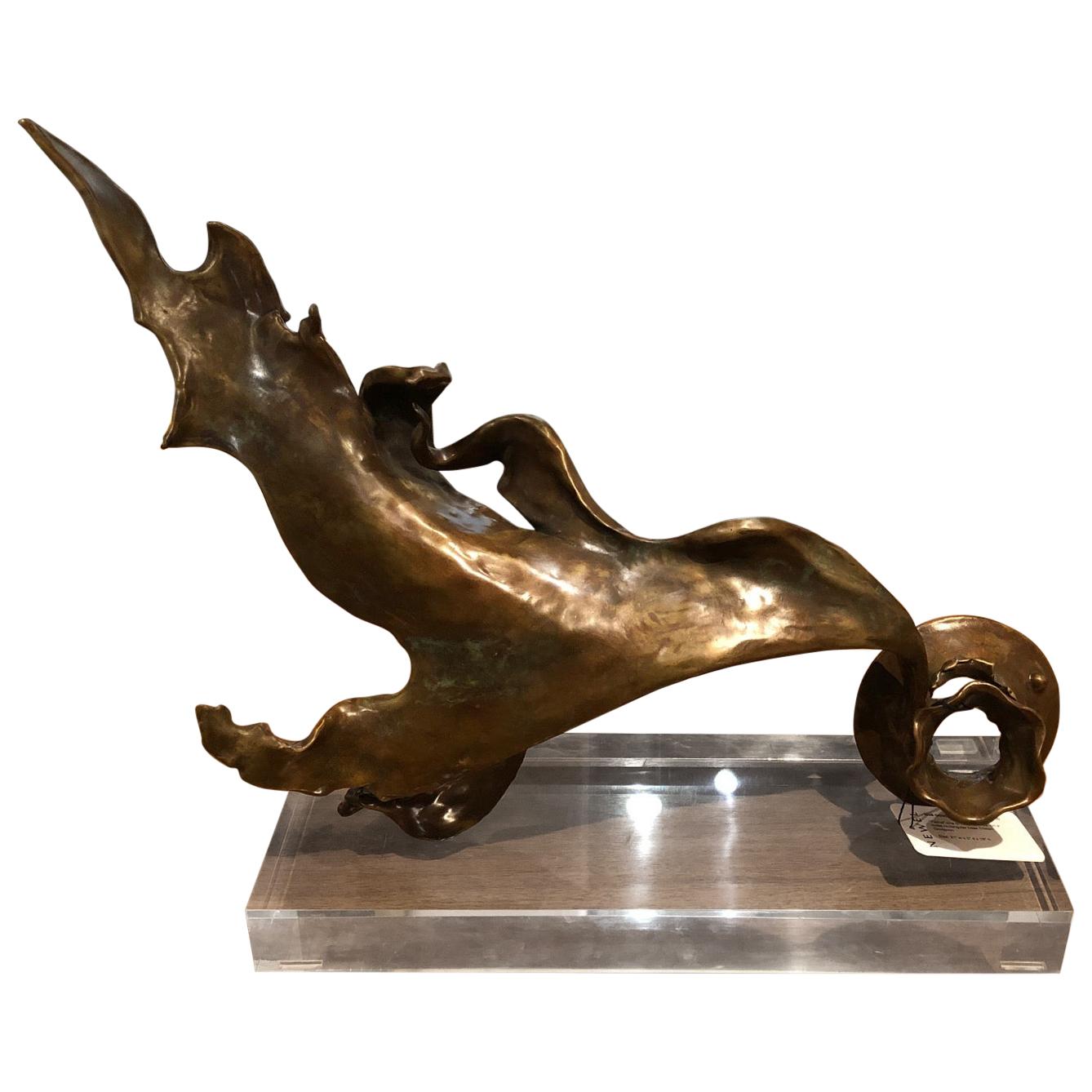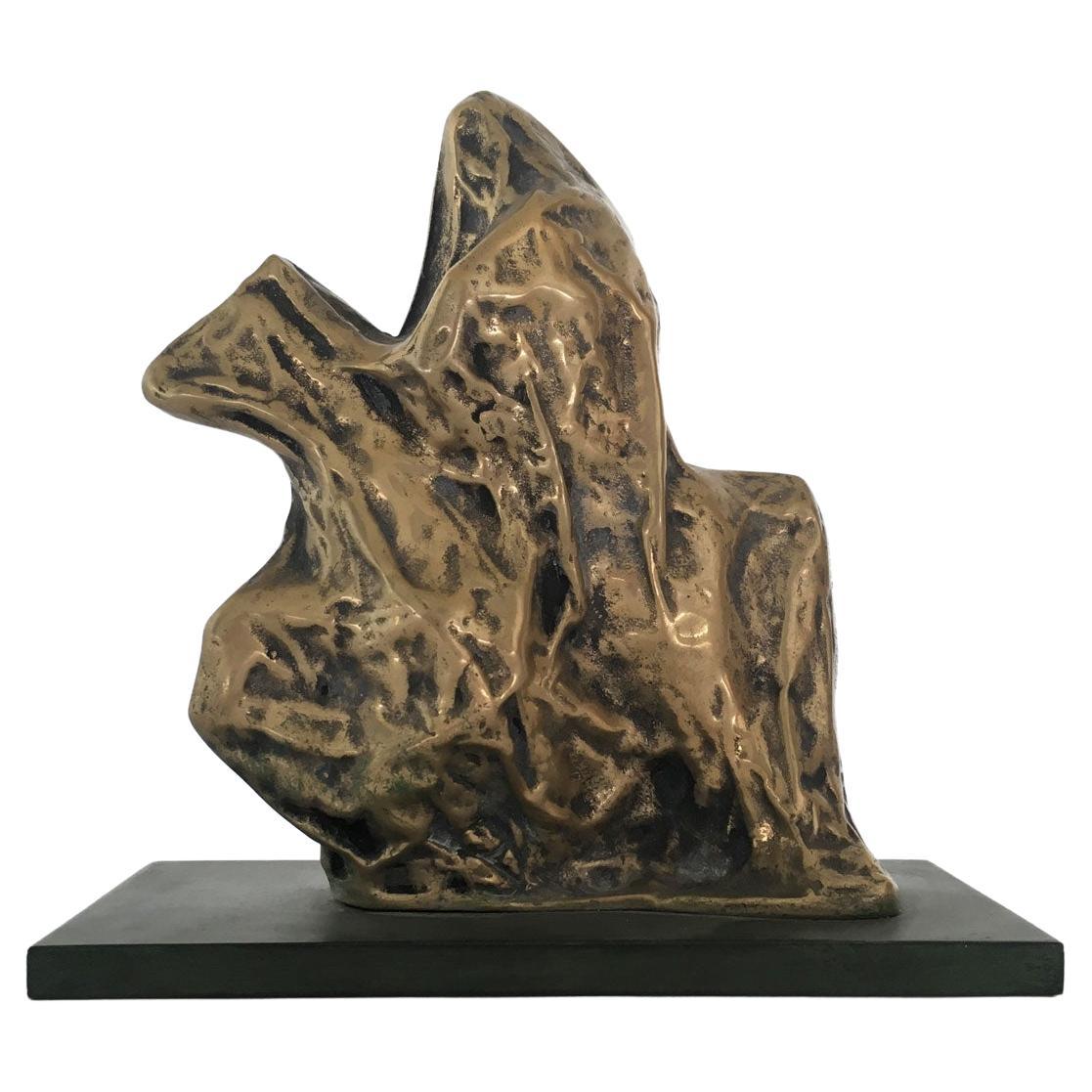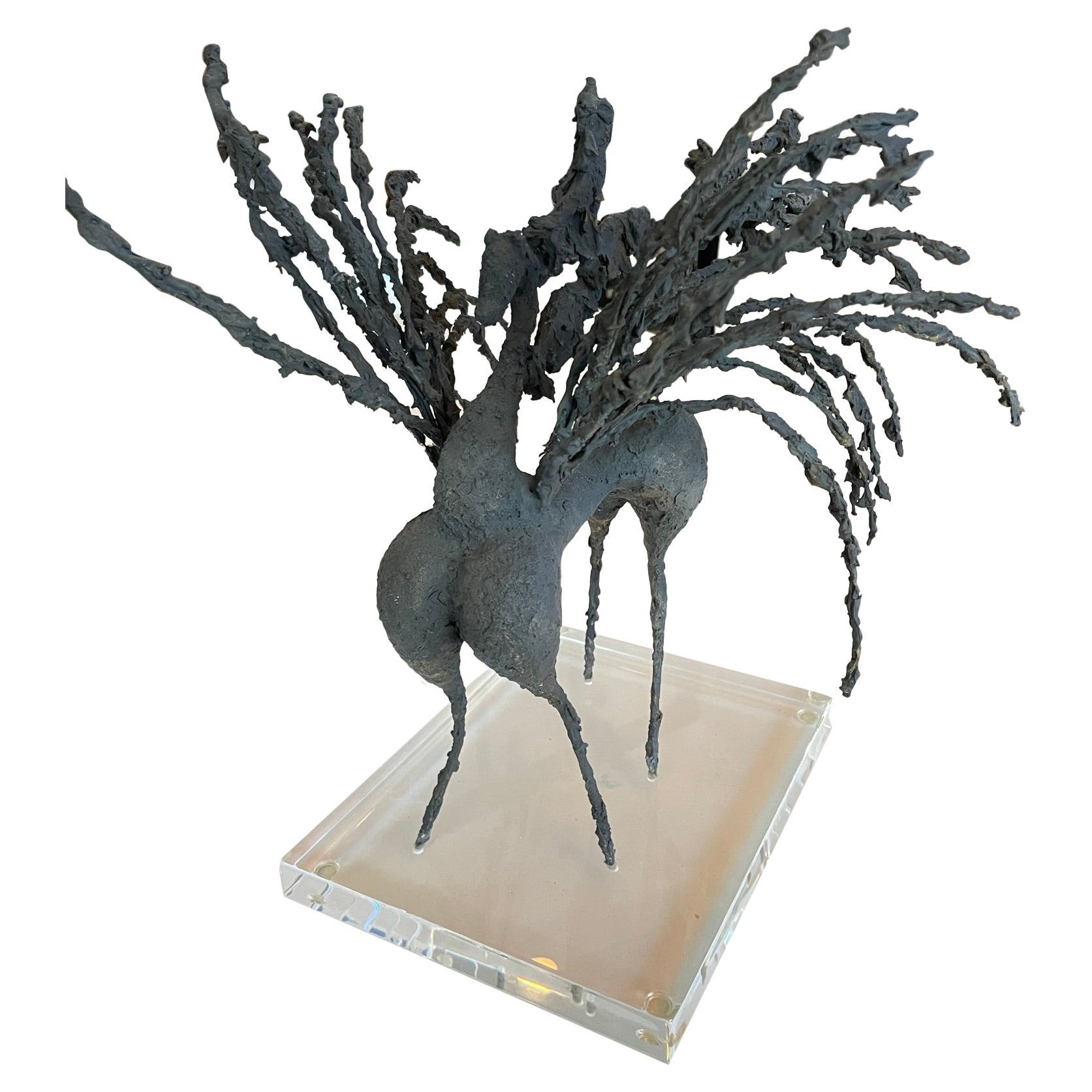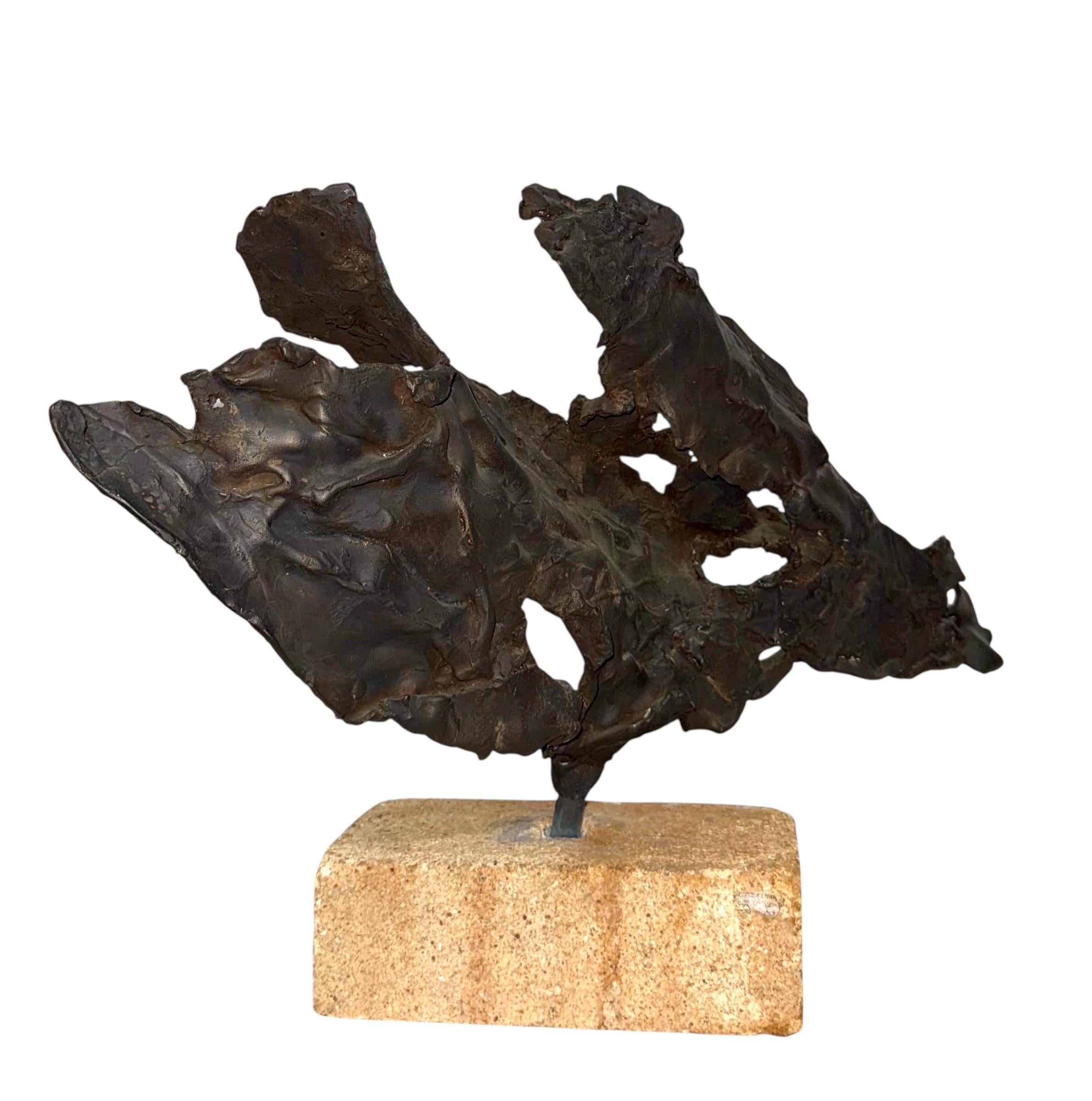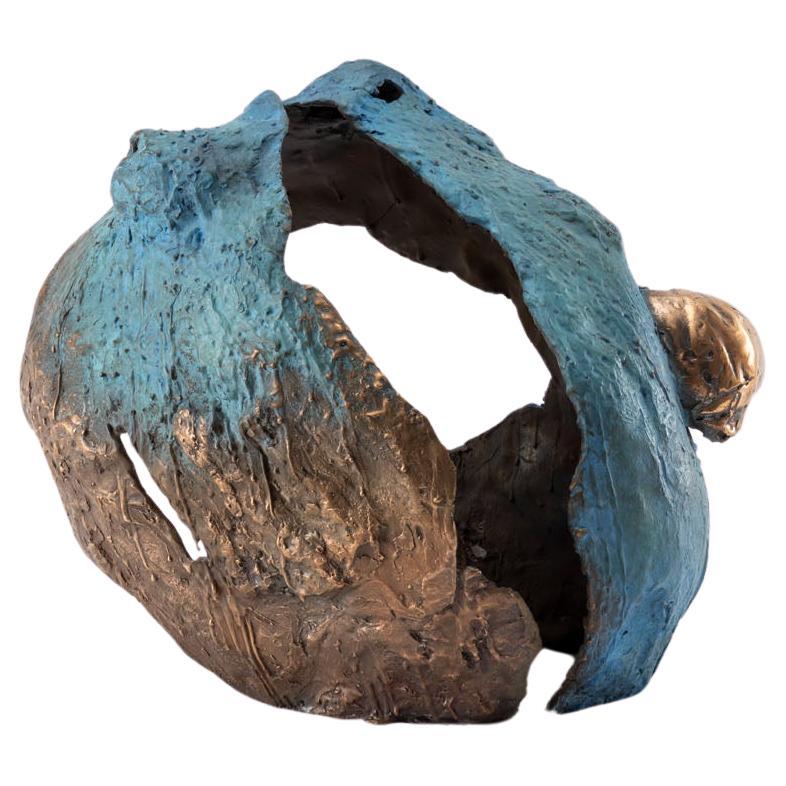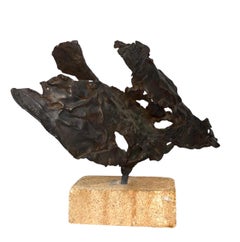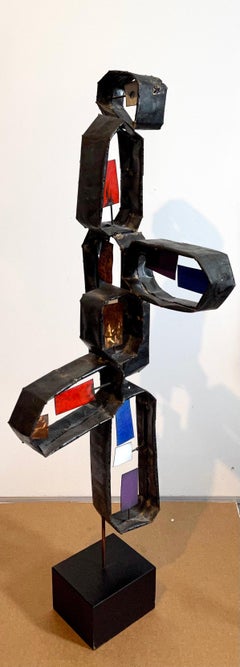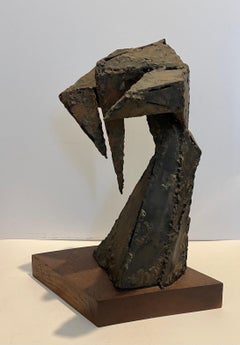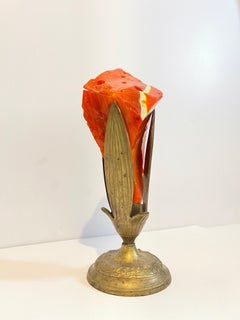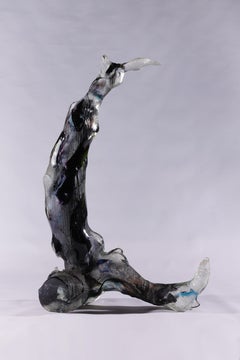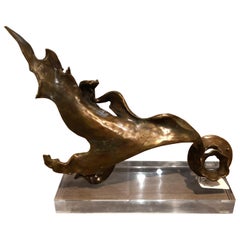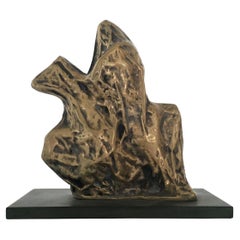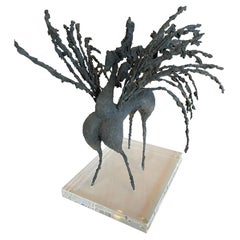Items Similar to Abstract Sculpture 'Ten Fathoms' (Swimming Fish) Bronze with Glass Unique Piece
Want more images or videos?
Request additional images or videos from the seller
1 of 7
Margaret Peggy ReventlowAbstract Sculpture 'Ten Fathoms' (Swimming Fish) Bronze with Glass Unique Piece
$4,500
£3,394.16
€3,920.29
CA$6,304.81
A$7,010.59
CHF 3,670.17
MX$85,635.63
NOK 46,119.29
SEK 43,384.43
DKK 29,264.71
About the Item
Margaret Reventlow, American born London, 1915 - 2014, "Ten Fathoms Deep", (swimming fish) bronze with green and red slag glass, unsigned, with artist name, title, etc on a label on its swivel base.
Provenance: From the Estate of Countess Margaret Peggy Reventlow, Philanthropist and Artist, Direct Descendent of John Jacob Astor, then to the Oliver Wolcott Library. Reventlow's first exhibition was at the Palm Beach Gallery and she went on to shows in New York, London, Connecticut and Nantucket.
MARGARET PEGGY REVENTLOW (Margaret Astor Drayton)
American, 1915-2014
Peggy was born in London, England on December 20th, 1915. Her father, William Astor Drayton, was a great grandson of John Jacob Astor. In 1942, Peggy became Countess Margaret Reventlow when she married Danish Count Court Haugwitz-Hardenberg Reventlow.
Rentlow studied at Le Cours Maintnon in Paris and at Le College Feminin de Bouffemont. She studied sculpture with Oliver Barret and Felix de Weldon. She attended the Art Students League for six years, studying with Leo Manso and Bruce Dorfman. The resulting abstract paintings are rich and colorful, done in both acrylics and oils. “My paintings are all about movement and color and composition,” she said. “You have to work that way with abstract art.
Reventlow’s first solo New York exhibition took place at Hammer Galleries in 1961 and she exhibited there until 1968. In 1964 she had a solo exhibition at Tiffany and Co. Her work has been presented at the Palm Beach Galleries and at The Alwin Gallery in London as well as in Litchfield, Connecticut; Nantucket; Norfolk, Connecticut and elsewhere.
Her sculptures and paintings reflect her lifelong love of the outdoors and sports. Writing in Arts Magazine, critic William D. Allen remarked on the vibrant character of her work which he compared to that of the noted German Expressionist sculptors Ernst Barlach and Wilhelm Lehmbruck. Countess Reventlow was represented in New York by Viridian Artists.
- Creator:Margaret Peggy Reventlow (1915 - 2014, American)
- Dimensions:Height: 18 in (45.72 cm)Width: 15 in (38.1 cm)Depth: 14 in (35.56 cm)
- Medium:
- Movement & Style:
- Period:
- Condition:slag glass with natural defects and inclusions, bronze and glass are good.
- Gallery Location:Surfside, FL
- Reference Number:1stDibs: LU38212162112
About the Seller
4.9
Platinum Seller
Premium sellers with a 4.7+ rating and 24-hour response times
Established in 1995
1stDibs seller since 2014
1,799 sales on 1stDibs
Typical response time: <1 hour
- ShippingRetrieving quote...Shipping from: Surfside, FL
- Return Policy
Authenticity Guarantee
In the unlikely event there’s an issue with an item’s authenticity, contact us within 1 year for a full refund. DetailsMoney-Back Guarantee
If your item is not as described, is damaged in transit, or does not arrive, contact us within 7 days for a full refund. Details24-Hour Cancellation
You have a 24-hour grace period in which to reconsider your purchase, with no questions asked.Vetted Professional Sellers
Our world-class sellers must adhere to strict standards for service and quality, maintaining the integrity of our listings.Price-Match Guarantee
If you find that a seller listed the same item for a lower price elsewhere, we’ll match it.Trusted Global Delivery
Our best-in-class carrier network provides specialized shipping options worldwide, including custom delivery.More From This Seller
View AllBrutalist Israeli Bronze Abstract Sculpture Wave Form Zvi Aldouby
Located in Surfside, FL
Zvi Yehuda Aldouby (1904 - 1996) was active/lived in Israel. Zvi Aldouby is known for Artist, teaching.
Biography photo for Zvi Jehuda Aldouby
Zvi Yehuda Aldouby (Hirsch Leib Zupnick), sculptor, born 1904, Galicia. Immigrated 1924. Upon aliyah in 1924 he worked in agriculture and construction. 1936-51 studied art and the history of art with Trude Haim, Professor J. Schwartzman, Ds. Schiff, Pinkerfeld, Aviyona, Javetz, and others.
After WWII he worked for the Jewish Agency as an envoy in Italy under the aegis of the UNWRA, on the welfare of the survivors of the Holocaust in the DP Camps. In 1948 in Paris, he evaluated advanced studies in European Art Centers. He was a member of the Israel Painters and Sculptors Association. He was a member of the Artists' Village in Ein Harod from its inception. EIN HAROD About the Museum's Holdings: Israeli art is represented by the works of Reuven Rubin, Zaritzky, Nahum Gutman, Mordecai Ardon, Aharon Kahana, Arie Lubin, Yehiel Shemi, Yosl Bergner and others.
The graphic arts collection contains drawings and graphic works by Camille Pissarro, Modigliani, Jules Pascin, Marc Chagall (almost all of his graphic work), and numerous other artists. The sculpture collection includes works by Jewish sculptors from all over the world including leading Israeli sculptors; Ben Zvi, Lishansky, David Palombo (brutalist), Yehiel Shemi, Aharon Bezalel and Igael Tumarkin (surrealist). Many Jewish sculptors from all parts of the world, beginning with Mark Antokolsky, are represented in the collection. In the sculpture courtyard there are works by Chana Orloff, Jacob Epstein (the works he bequeathed to the Museum), Enrico Glicenstein, Loutchansky, Constant and Indenbaum from Western Europe; Glid from Yugoslavia; William Zorach, Chaim Gross and Minna Harkavy from the United States; and most of the outstanding sculptors of Israel : Zev Ben-Zvi, Lishansky, Ziffer, Rudi Lehmann, Dov Feigin, Moshe Sternschuss, Zvi Aldouby, Yehiel Shemi, Aharon Bezalel, Hava Mehutan, Igael Tumarkin.
Education:
1924-28 Hebrew University, Jerusalem, graduated
1931-37 Teachers' Seminar, Jerusalem, Teacher's Certificate
1938-29 Advanced studies, with Trude Haim
Joseph Schwarzman, School of Art
1948-50 Advanced studies in Italy and France
Teaching
Taught history of art and sculpture Holon
Awards And Prizes
1957 Herman Struck Prize, Artists' Association of Haifa and the North, Haifa Municipality
1963 Dizengoff Prize for Painting and Sculpture, Municipality of Tel Aviv-Jaffa
1964 Medal from Monaco International Exhibition
1965 Prize for the ''Breakthrough into the Negev'' proposal for a monument, Givati Corps, 52nd Brigade
1967 The Histadrut Executive Prize
1991 Worthy Citizen of Tel Aviv Award, Municipality of Tel Aviv-Jaffa
Environmental Sculptures
1961 Levant Fair, Tel Aviv, "A Sculpture in a Garden"
1968 Atlit Youth Club, Bas- Relief- "Davd Playing Before King Saul"
1969 Netivot (Negev), "Yizkor"- Monument memorializing Aliyat Hanoar youngsters from Tunisia who perished in an air crash.
1944 Collective Annual Exhibition by Palestinian Artists
Art Gallery of the ''Habima'' Building, Tel Aviv
Artists: Hermann Struck, Moshe Sternschuss, Arie Reznik, Aaron Priver, Yitzhak Itzhak Danziger, Zvi Aldouby, Menachem Shemi, Moshe Castel, Shmuel Ovadyahu, Yohanan Simon, Marcel Janco.
Group Exhibition - Etched Voices, Yad Vashem, Jerusalem painting...
Category
1950s Abstract Sculptures
Materials
Limestone, Bronze
Italian Mid Century Mod Large Brutalist Welded Copper Enamel Sculpture Wood Base
Located in Surfside, FL
Welded, brazed, copper (based on the weight, this might be iron or bronze) with colorful inset enamel plaques on a painted wood base. A studio handmade Brutalist sculpture in a mann...
Category
Mid-20th Century Abstract Abstract Sculptures
Materials
Metal, Copper, Enamel
Abstract Expressionist Biomorphic Welded Metal Sculpture
By Seymour Lipton
Located in Surfside, FL
Welded, brazed sculpture on wooden base
This is not signed or dated
This work is unsigned. We were told it was the work of Seymour Lipton but as there is further documentation we are selling it as attributed and cannot guarantee it as such.
Seymour Lipton (1903 – 1986) was an American abstract expressionist sculptor. He was a member of the New York School who gained widespread recognition in the 1950s. He initially trained as a dentist, like fellow sculptor Herbert Ferber, receiving his degree from Columbia University in 1927. In the late 1920s, he began to explore sculpture, creating clay portraits of family members and friends. His early choices of medium changed from wood to lead and then to bronze, and he is best known for his work in metal. Like his contemporary, Abstract Expressionist Jackson Pollock, and Arshile Gorky Lipton was influenced by Carl Jung’s work on the unconscious mind and the regenerative forces of nature. He translated these two-dimensional drawings into three-dimensional maquettes that enabled him to revise his ideas before creating the final sculpture. The forms that Lipton produced during this period were often zoomorphic, exemplifying the tension between the souls of nature and the automatism of the machine. He made several technical innovations, including brazing nickel silver rods onto sheets of Monel to create rust resistant forms. Seymour Lipton is best known for his textured torch welded metal sculptures...
Category
1950s Abstract Expressionist Abstract Sculptures
Materials
Metal
Early Murano Glass Free Form Abstract Blown, Cut, Glass Sculpture in Bronze Vase
Located in Surfside, FL
This piece appears unsigned and unmarked. It came from an important estate in the Palm Beach area.
It is an abstract flame or torch in a bronze vase.
Venetian glass (Italian: vetro ...
Category
1940s Abstract Abstract Sculptures
Materials
Bronze
Mid Century Modern Brutalist Welded Abstract Expressionist Sculpture
Located in Surfside, FL
Neo-Dada Abstract Sculpture: Assemblages
In contrast, abstract sculpture followed a slightly different course. Rather than focusing on non-figurative subject matter, it concentrated...
Category
Mid-20th Century Abstract Expressionist Abstract Sculptures
Materials
Metal
Brutalist Bronze Abstract Modernist Sculpture
Located in Surfside, FL
In the manner of Julio Gonzalez, mixed metal sculpture.
Neo-Dada Abstract Sculpture: Assemblages
Abstract sculpture followed a slightly different course. Rather than focusing on non-figurative subject matter, it concentrated on materials, hence the emergence of Assemblage Art - a form of three-dimensional visual art made from everyday objects, said to be 'found' by the artist (objets trouves). Popular in the 1950s and 1960s in America, assemblage effectively bridged the gap between collage and sculpture, while its use of non-art materials - a feature of Neo-Dada art - anticipated the use of mass-produced objects in Pop-Art. Assemblage sculpture is exemplified by the works of Louise Nevelson (1899-1988), such as Mirror Image 1 (1969, Museum of Fine Arts, Houston), and by Jean Dubuffet (1901-85) and his Monument with Standing Beast (1960, James R. Thompson Center, Chicago). The idiom was considerably boosted by an important exhibition - "The Art of Assemblage" - at the Museum of Modern Art, in New York, in 1961.
Other examples of the Neo-Dadaist-style "junk art...
Category
20th Century Abstract Expressionist Abstract Sculptures
Materials
Bronze, Copper
You May Also Like
Abstract Cast Glass Sculpture, 'Altair', 1993 by David Ruth
By David Ruth
Located in Oakland, CA
'Altair' is a contemporary abstract cast glass sculpture by David Ruth from his Internal Space series. David fused various colored glass to create a layered, suspended, and vibrant ...
Category
1990s Abstract Expressionist Abstract Sculptures
Materials
Glass
Tristan Govignon "Flame" Abstract Bronze Sculpture on a Lucite Base
By Tristan Govignon
Located in Queens, NY
"Flame" one of a kind bronze, on a Lucite rectangular base Tristan Govignon.
Category
21st Century and Contemporary Organic Modern Abstract Sculptures
Materials
Bronze
1980 Italy Post-Modern Cristina Roncati Bronze Abstract Sculpture Cavaliere
Located in Brescia, IT
This artwork was created by the Italian artist Cristina Roncati. The title "Cavaliere del mistero" Knight of the mistery
Cristina Roncati was born in...
Category
Late 20th Century Italian Post-Modern Abstract Sculptures
Materials
Bronze
Abstract Bronze Sculpture, France, 1940s
Located in Los Angeles, CA
Rare and unique bronze sculpture, on custom lucite base. France, 1940s.
Category
Mid-20th Century French Expressionist Abstract Sculptures
Materials
Bronze
Stone fish, contemporary sculpure in cast bronze, blue patina
By Alessandra Pasqua, Wanderart
Located in Roma, IT
Stone fish. A master of camouflage, the stonefish is the most venomous known fish in the world. Just let him be.
*80% recycled bronze
*Wanderart metal-cast artworks are all hand mad...
Category
2010s Italian Modern Abstract Sculptures
Materials
Bronze
Mid-Century Modern Green Marble & Bronze Fish Sculpture
Located in Brooklyn, NY
Very unique vintage modern sculpture features a bronze fish swimming through a field of seaweed on a green marble base. This truly one of a ki...
Category
Vintage 1960s Mid-Century Modern Animal Sculptures
Materials
Marble, Bronze
$315 Sale Price
30% Off
More Ways To Browse
Bronze Sculpture Denmark
Glass Fish Sculpture
Glass Sculpture Colorful
Bronze Fish Sculpture
Hammered Bronze Sculpture
Tiffany Hammer
Tiffany Label
Arts Slag Glass
Green Glass Fish Sculptures
Tiffany Fish Gold
Dewey Smith Sculptures
Flavius Pisapia
Lauren Kaplan
Lori Park
M Jacobson
Sasha Koozel Reibstein
Tomasini Paris
Tu Y Yo
